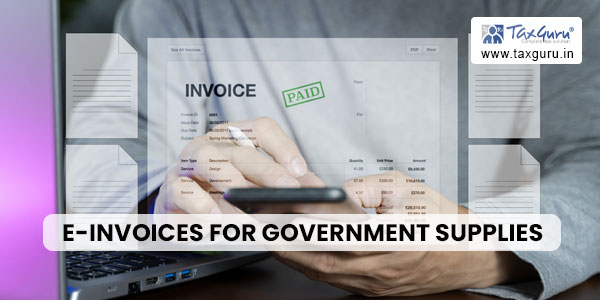
The National Informatics Centre has issued a crucial clarification regarding the issuance of Business-to-Business (B2B) e-invoices for supplies made to government departments or agencies. This clarification aims to provide insights into the applicability of e-invoicing rules and compliance for transactions involving government entities.
The National Informatics Centre has issued a crucial clarification regarding the issuance of Business-to-Business (B2B) e-invoices for supplies made to government departments or agencies. This clarification aims to provide insights into the applicability of e-invoicing rules and compliance for transactions involving government entities.
Clarification on E-Invoicing for Government Supplies:
The GST Policy Wing recently released a clarification (Circular No. 198/10/2023-GST dated: 17.07.2023) addressing the applicability of e-invoicing to supplies made to government departments or agencies. The following points summarize the key aspects of this clarification:
1. Compulsory Registration for Government Entities: Government departments, establishments, government agencies, local authorities, and Public Sector Undertakings (PSUs) that are required to deduct tax at source under section 51 of the CGST/SGST Act are mandated to obtain compulsory registration as per section 24(vi) of the CGST Act. This means that these entities, registered solely for the purpose of tax deduction at source, are considered registered persons under the GST law, as per clause (94) of section 2 of the CGST Act.

2. E-Invoicing Requirement: As per the provisions of rule 48(4) of the CGST Rules, registered persons whose turnover exceeds the prescribed threshold for e-invoicing are obligated to issue e-invoices. This rule is applicable to all supplies made to government departments, establishments, government agencies, local authorities, PSUs, and similar entities. In essence, if a registered supplier falls under the purview of e-invoicing, they must generate e-invoices for transactions with these government entities.
3. Use of GSTIN of Government Department/Agency: The clarification emphasizes that taxpayers who have been notified for e-invoice generation and are supplying goods or services to government departments or agencies must generate B2B e-invoices. These e-invoices should include the Goods and Services Tax Identification Number (GSTIN) of the respective government department or agency as part of the invoicing process.
Conclusion:
This clarification provides valuable guidance to businesses and taxpayers involved in supplying goods or services to government entities. It underscores the importance of understanding the e-invoicing rules and compliance requirements when dealing with government departments, agencies, local authorities, and PSUs. By ensuring that B2B e-invoices include the correct GSTIN of the government entity, businesses can align with the GST law and facilitate smooth transactions with the government. Compliance with these guidelines is essential for promoting transparency and efficiency in government-related transactions while adhering to GST regulations.
